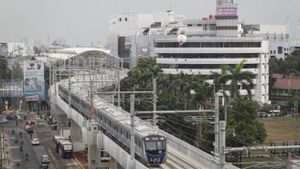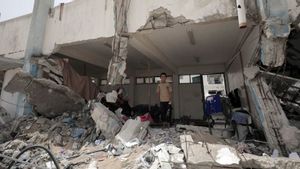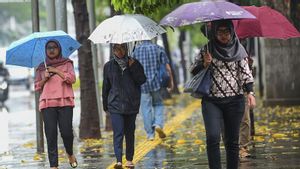JAKARTA Tourism is the main economic sector in Bali. But behind the high contribution of tourism to Bali, there is a dark side that local people feel. They now have difficulty owning property in their own homeland, because the price has soared sharply.
Recently, the United Nations Tourism chose Jatiluwih Village, Penebel District, Tabanan, Bali as one of the best villages in the world. Jatiluwih Village was nominated based on the recommendations of 260 applications spread across 60 countries. This village is also famous for its expanse of rice fields with a subak system.
Apart from Jatiluwih Village, Wukirsari Village, Bantul Regency, Yogyakarta is also included in the best village category.
Indeed, Balinese people rely on the tourism sector to move the economy in their area. According to the Central Statistics Agency (BPS), more than three million foreign tourist visits to Indonesia in the first quarter of 2024.
Bali remains the favorite destination for foreign tourists, with Ngurai Rai Airport welcoming 44.5 percent of the total foreign visitors to Indonesia.
The tourism sector contributed greatly, accounting for 50 percent of the total Gross Domestic Product (GDP) of Bali Province, and generated foreign exchange of more than 10 million US dollars or around Rp. 162 billion.
The beauty of Bali is not only attracting tourists, but also investors. So they don't just come on vacation, but some foreigners come to invest by buying property there or establishing other businesses.
In addition, many foreign tourists also come to settle. Usually they were originally just on vacation in Bali, but then stayed months, for years.
This condition then led to the assumption that Bali tourism is keeping the dark side. Because even though from an economic point of view it brings profit, on the other hand it creates problems for local residents. One of them is the issue of ownership of houses and land for local residents.
The website of the Bali property data provider, Reininfo, said that property prices on the Island of the Gods rose 7 percent per year in the last five years. The average land price in Gianyar, for example, is currently priced at IDR 300 million per 100 m2, while in Denpasar the average land price reaches IDR 1 billion per 100 m2. This crazy land price occurs due to high demand, infrastructure development, and the large amount of land used as hotels and villas.
Residents complain about the increase in property prices in Bali. They have difficulty owning land or houses in their own homeland. The Provincial Minimum Wage (UMP) in Bali for the year is IDR 2,813,672, with the highest UMR in Badung Regency, which is IDR 3.31 million.
This phenomenon did not only occur in Bali, but also experienced by residents in other popular tourist areas in the world. In the middle of this year, Spain was shocked by the news of a massive demonstration in Barcelona. They turned out to protest against the massive development of tourism which actually had an impact on the increase in the cost of living of local residents, including the increase in property rentals.
Residents in Malaga admit that it is difficult to find apartments at a rental price of less than 1,200 euros to 1,300 euros per month (equivalent to Rp20.5 million-Rp22.2 million), because the average salary in the area ranges from 1,600 euros per month (R27.3 million).
The tourism industry plays an important role for the economy and encourages post-pandemic economic recovery. But for some people, mass tourism that leads to overtourism is a loss to local residents. Overtourism occurs when local residents feel their daily lives are disrupted due to the presence of tourists.
A study published in the journal European of Tourism Research in 2021 states that overtourism creates gentrification, environmental and social damage, traffic jams, tourism-centric strikes.
In particular, gentriification is a process of changing an area characterized by increased property value, land use, and the entry of a new socio-economic group that is more prosperous.
Tourism Gentriification plays an important role in areas with lower economic development by relying on tourism as a factor of development and growth.
SEE ALSO:
The English, Chinese, Japanese, Arabic, and French versions are automatically generated by the AI. So there may still be inaccuracies in translating, please always see Indonesian as our main language. (system supported by DigitalSiber.id)















